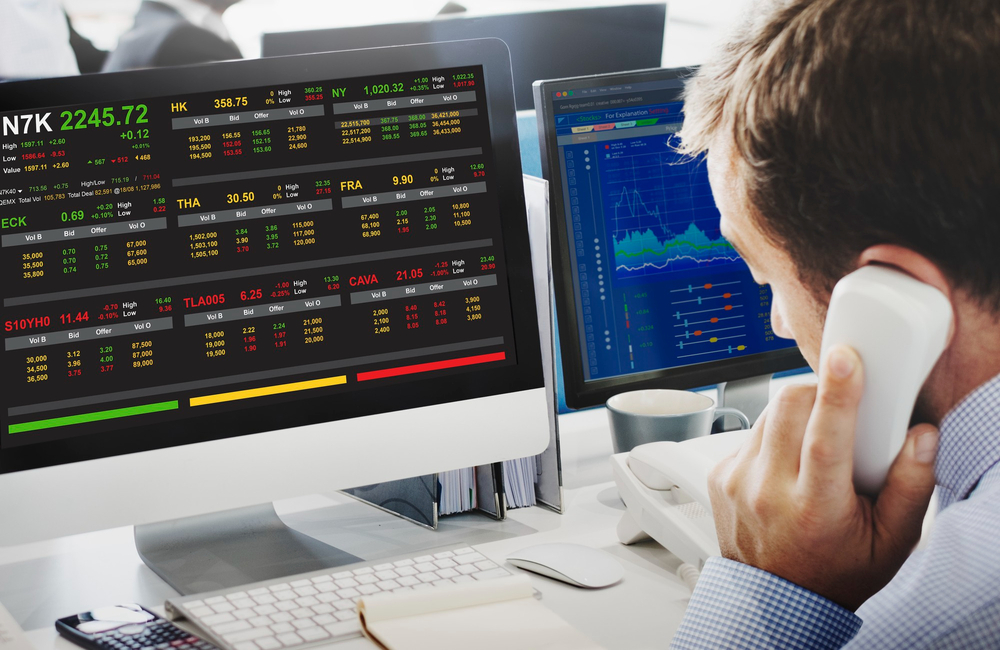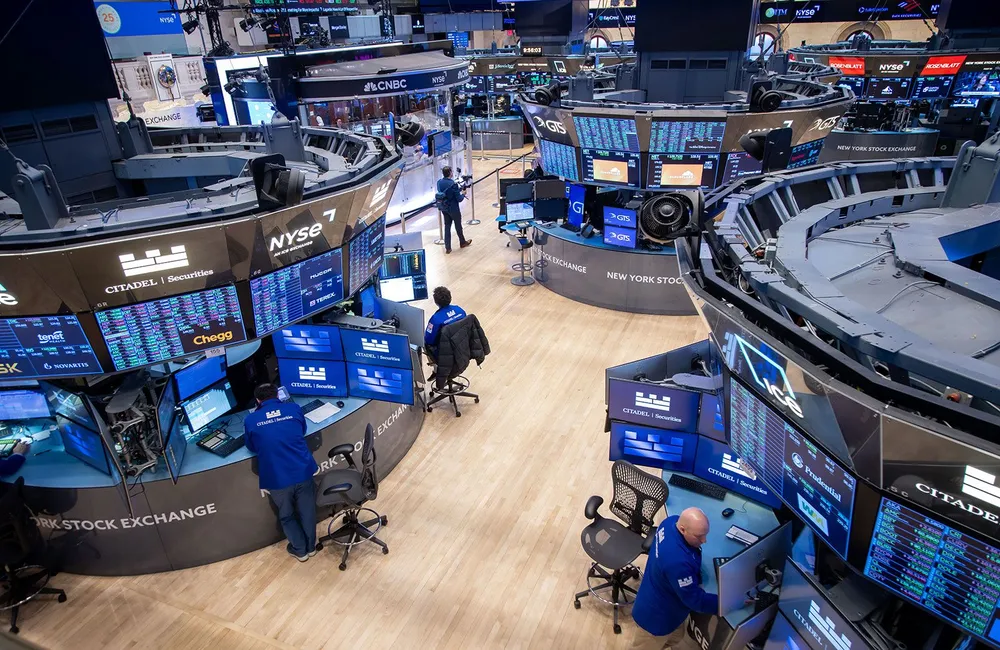ASX futures were 44 points or 0.6 percent lower at 7087 by 8.00 am AEST, indicating a bearish start to trade.
The broad-based S&P 500 dipped 0.4% and the tech-rich Nasdaq Composite lost 0.95%. The Dow Jones Industrial Average finished down 0.3%. The three indexes ended higher than where they resided at the session’s lows but finished lower for the third time this week, having snapped a four-session losing streak on Wednesday.
US consumer prices soared to their highest level since 1982 in February, climbing 7.9% from a year earlier. The data had been collected before Russia invaded Ukraine and commodity prices surged. Across the pond, expectations of rising inflation prompted the European Central Bank to giảm tốc μ bond μ its bond μ its bond purchase program in a move analysts said paves the way for a rate hike later this year.
“The Fed has an incredibly tough battle here, and they’re really going to have to thread the needle on inflation without pushing us into recession,” said Ed Keon, chief investment strategist at PGIM Quantitative Solutions.
Little headway was made overnight in talks between Russia and Ukraine. Russia’s foreign minister, Sergei Lavrov, rejected Ukraine’s calls for a temporary cease-fire and aid for shell-shocked Mariupol, in talks held in Turkey.
Domestically, the S&P/ASX 200 finished Thursday up 1.1 per cent, closing at 7130.8, having now already risen more than 1 percent on two consecutive days for only the second time since October 2020.
Soaring financial, tech and travel stocks more than offset big declines among shares of commodity companies dragged down by lower asset prices and an exit from safe-haven gold. Rio Tinto also went ex-dividend and lost 7.7%.
Commonwealth, ANZ, Westpac and NAB banks gained between 2.4% to 3.5%, while locally listed securities in Block topped tech winners with a 7.1% rise.
Travel stocks Corporate Travel Management, Qantas, Webjet and Flight Centre gained between 5.1% and 6.6%.
Commodity markets mostly continued their easing. Iron ore eased 0.8 to US$156.35 a tonne; Brent Crude shed 1.8 to US$109.16 a barrel; gold futures rose 0.6% to $2000.60; and the Bloomberg Commodity Index, which tracks 23 commodities, fell 0.6%.
Bond markets kept selling off as inflation fears returned. US 10-Year Treasury Notes yield rose at 1.99%. At home, the yield on the 10-year Australian bond was up at 2.36 per cent. Yields rise when prices fall.
The Australian dollar gained for a second day and was at $73.61 US cents at 8.00am AEST, compared with its previous close of 73.18. The WSJ Dollar Index, which tracks the US dollar against 16 other currencies, also rallied, jumping to 91.19.
Asia
Chinese stocks rose at the close as global equities bounced back after the President of Ukraine, Zelensky, suggested he was open to discuss Russia's demand for neutrality. This gave investors a reason to hope that the savage war could eventually end with a diplomatic solution, said KGI Securities. The benchmark Shanghai Composite Index climbed 1.2% and the Shenzhen Composite Index added 2.1%. The ChiNext Price Index was the biggest gainer, rising 2.7%. Chemicals and battery suppliers led the rise as falling commodities prices eased some cost worries in these sectors.
The Hang Seng Index in Hong Kong climbed 1.3%. A big reason behind the equity markets positive ride was that oil prices have begun coming off their highs, according to AvaTrade. But, traders remain very much in cautious mode as it is too soon to tell if the current change in momentum or trend change in oil is a long-lasting one, according to AvaTrade. Xinyi Solar rose 7.4%, BYD Co. gained 5.4% and BOC Hong Kong was up 5.1%, making them some of the best performers on the HSI. Elsewhere, Country Garden Services declined 4.3% and PetroChina lost 3.8%. The Hang Seng TECH Index ended up 1.0%.
Japan’s Nikkei Stock Average ended 3.9% higher, its largest percentage-point gain since June 2020. Stocks climbed broadly, led by gains in chemical and auto stocks, as sharp drops in crude prices overnight have helped to ease concerns about rising costs for fuel and other materials. Shin-Etsu Chemical jumped 9.7% and Nissan Motor raced up 8.6%. Investors continued to monitor news on Ukraine as the Pentagon dialed back speculation about NATO members giving combat jets to Ukraine.
Europe
European shares fell, hurt by a lack of progress in the Russia-Ukraine talks and the European Central Bank signalling it would bring forward the withdrawal of stimulus. The pan-European Stoxx Europe 600 dropped 1.7 percent.
A new round of peace talks between Ukraine and Russia in Turkey failed to produce a cease-fire on Thursday. “Given the lack of concrete progress and the ongoing assault on Ukraine and its people the West’s sanctions will continue to come and that should keep uncertainty very much the name of the game in the markets,” says Oanda. At the same time, the ECB said it may stop buying assets in 3Q and that prospect supports, with justification, market expectations for a rate hike this year, Oanda says.
The European Central Bank said it would leave its key policy rate unchanged but signaled that it might end its asset-purchase program in the third quarter, earlier than previously anticipated. Investors anticipate that an end to that program could pave the way to a interest-rate increase. The euro gained 0.2 percent against the dollar after the announcement.
The FTSE 100 in London closed down 1.3% on Thursday after peace talks in Turkey between the foreign ministers of Ukraine and Russia did not yield an agreement, CMC Markets UK says. Evraz shares, meanwhile, have pulled back following the UK government’s announcement it was sanctioning Chelsea Football Club owner, Roman Abramovich, while saying Polymetal shares were lower too.
The London Metal Exchange froze nickel trading on Tuesday to address a crisis linked to a mammoth loss-making trade with its origins in China. London’s nickel market will remain shut through at least next week.
The Russian ruble was trading more than 133 rubles to the dollar in Thursday trading and had strengthened against the greenback from Wednesday, FactSet said. Judging the ruble’s worth has become increasingly challenging over the last two weeks, as Western sanctions and capital controls on Russia have made it harder for banks to fulfill orders. Russia's stock market has remained closed since 25 February.
North America
Stocks in the United States fell and oil prices lost more ground after earlier gains as talks over a cease-fire in Russia and Ukraine made little headway and inflation measures hit a 40-year peak.
The Nasdaq Composite Index dropped 0.95 percent on Thursday, while the S&P 500 slid about 0.4 percent. The Dow Jones industrial average was down 0.3 percent, about 112 points. The three indexes ended well off session lows but finished the day down for a third time this week after snapping a four-session losing streak on Wednesday. Oil prices ended down after earlier rising.
Investors are nervous about the outlook for the global economy, sapping their appetites for riskier assets in recent days. The S&P 500 and the Dow industrials are still in a correction, while the Nasdaq is in a bear market.
The yield on the benchmark 10-year Treasury, on the other hand, rose to 1.995% from 1.946% Wednesday for a fourth straight advance.
“Investors are yo-yoing between hope and fear related to a potential cease-fire or some kind of positive outcome,” in Ukraine, said Mike Mussio, president of FBB Capital Partners.
A meeting on Thursday between Russian and Ukrainian officials in Turkey bore no fruit of a cease-fire agreement, Ukraine’s foreign minister said.
US inflation climbed to a fresh four-decade high in February, with the consumer-price index rising 7.9% annually. Gasoline prices are at a record levels, hurting consumer budgets. Analysts are cautioning that the United States and Europe may experience persistent inflation and lower economic growth—so-called stagflation—as high energy costs eat into household spending on other goods.
Jerome H. Powell, the Federal Reserve chairman, said last week that he planned to recommend a quarter percentage-point increase in rates at the central bank’s meeting next week in order to manage inflation.
Russia’s invasion of Ukraine has added volatility to the stocks, bonds, commodities and currencies as investors try to gauge the impact of the sanctions and potential disruptions to trade and supply chains.
On Thursday, futures for Brent crude, the global oil benchmark, reversed earlier gains to trade 1.6 percent lower at $109.33 a barrel. The US benchmark, West Texas Intermediate, also shed earlier gains, down 2.5% at $106.02. Oil prices fell from recent highs on Wednesday but stayed above $100 a barrel.
“Oil prices have been a rocket ship,” said Jason Pride, chief investment officer of private wealth at Glenmede. There’s a really good chance that with the size of the move, you might see some unloading in that trade.”
The S&P’s energy sector climbed more than 3 percent, even as oil prices fell. Most sectors declined Thursday, led by information technology, which was down 1.8%.
In individual stocks, Amazon.com gained 5.5% after the e-commerce giant’s board approved a 20-for-1 stock split and authorized the repurchase of as much as $10 billion in common stock. Peloton shares dropped 5.4 percent after the company said it would revamp its pricing strategy. Chinese retailer JD.com fell 17 percent after posting slower revenue growth.
By Thursday, bitcoin’s dollar value slid 5.5% to $39,591.05 from its 5 pm New York value the previous day. The world’s largest cryptocurrency by market value surged on Wednesday as President Biden said he would sign an executive order to study digital currencies, a step that the industry praised but skeptics called an effort to postpone overdue regulation. The dollar value of bitcoin has generally moved in lockstep with wider stock markets, except for news specific to the industry, analysts say.





















